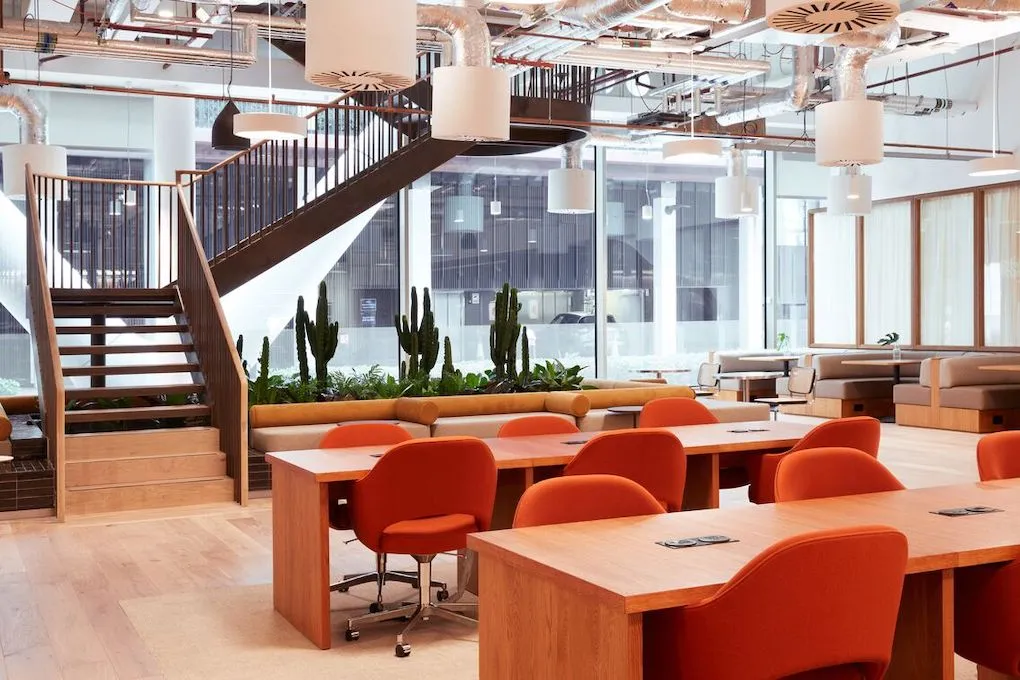Commercial real estate is the least liquid asset of any business. Lengthy, inflexible office space commitments can stifle a company’s growth by tying up capital expenditures and making it difficult to pivot when it needs to.
Enter transferability, a unique and innovative option WeWork has developed in order to address the myriad issues an enterprise might face during periods of unprecedented growth or uncertain times—such as during the COVID-19 pandemic.
Transferability enables enterprise companies to leverage the entire WeWork portfolio of products and locations and align their real estate strategy with their changing needs, according to Emily Pae, director of real estate advisory, transactions, finance, and strategy at WeWork.
“You aren’t locked down in a specific asset or for a restrictive term,” Pae says, “and this is a massive competitive advantage for fast-growing companies—or anyone who values agility in business. WeWork’s transfer options set agile companies up for success.”
Location transferability enables a company to move their offices from, say, Seattle to New York City. Product transferability enables a company to transfer the value of its current product to a different one, such as closing its large central Los Angeles headquarters and setting up regional satellite offices—or transferring the value of its WeWork All Access passes to a dedicated office space in one or more locations.
“The world changes, as we saw with COVID-19,” Pae says. “Every CFO was asking, ‘How do I reduce liabilities on my balance sheet, how can I be as efficient with my portfolio as possible?’ WeWork can do that by shifting around space to best match changing or emerging needs. Companies are allowed to change their real estate needs fluidly.”
Location and product transferability can be combined to create a fully customized solution, says Pae. For example, if a company has a three-floor headquarters in Detroit but wants to downsize to two floors and expand into two new markets, they can take the value of the one-floor commitment and transfer it to WeWork All Access passes in Miami and a small, dedicated office suite in Houston.
“This unique tool makes you as flexible and agile as possible, so you can make your employees as happy as possible and give your business the greatest possible competitive edge in your industry,” she says.
Here’s how three enterprise companies used the transfer option to navigate complex real estate challenges during periods of growth and remain flexible and competitive in the face of uncertainty.
An on-demand delivery company looks for flexibility in uncertain times
The challenge: A large on-demand delivery company was juggling unprecedented growth in the midst of the pandemic. It needed to attract talent in a range of markets in the U.S., Europe, and the Pacific despite uncertainty about the future.
The solution: WeWork’s large portfolio of assets in markets across the globe attracted the delivery firm initially. When leadership learned that leases could be transferred as needed to avoid being locked into a specific space for a designated period of time, it was a done deal. WeWork created multiple regional hubs in several markets for the firm, adding up to 134,000 square feet.

The result: The company is able to meet its office space requirements in real time, with the comfort of knowing it can quickly and easily adjust its assets as needed—and without penalties or an ocean of complicated red tape. As a result, the company feels confident about taking on more space, which in turn locked it into a strong discount across the company’s portfolio.
An enterprise member pivots its portfolio strategy easily
The challenge: A demand generation company with WeWork office space in Portland, Oregon, wanted to turn its attention to hiring a team in Atlanta, exit certain existing locations, and reprioritize other markets—while keeping an eye on capital expenditures and flexibility.
The solution: WeWork allowed the member to transfer its full space commitment in Portland to a new larger, dedicated headquarters in Atlanta.
The result: With a large portfolio of assets, flexible leases, and the ability to scale quickly, WeWork is able to support the company’s growth strategy in Atlanta and key markets. Transferability gives the company the agility it needs to stay competitive in a fast-moving industry. The familiar, data-driven design of WeWork office spaces provides employees everywhere with a consistent experience and workplace culture; a roster of amenities helps the company attract and retain top talent.
A software company prioritizes safety during the pandemic
The challenge: A large, London-based cloud software company—with nearly 8,000 square feet of office space on an upper floor of a WeWork location—wanted to ensure its spaces were as safe as possible during the pandemic so that employees could feel comfortable returning to work.
The solution: The company was able to transfer its full commitment to a first-floor dedicated office in the same building.

The result: The new office featured the same WeWork design, vibe, and enhanced safety features as the old space, but employees are now able to bypass the crowded elevator and access the office via the stairs. The new space is close to on-site bike storage, making a two-wheeled commute more convenient for employees who opt out of public transportation. A flexible, 30-month term, with options to expand at 12 and 24 months, gives the company peace of mind in an uncertain business climate.
Transferability is a tool that allows WeWork to help members get the most value out of their real estate dollars and keep their competitive edge, no matter where their business takes them or what uncertainties are thrown their way.
Kristen Bailey is a veteran writer and editor based in beautiful Lincoln, Nebraska. She has a penchant for helping large and small brands create stories that tell the why.
Rethinking your workspace?










